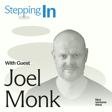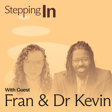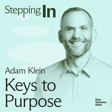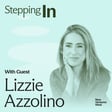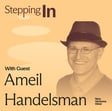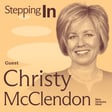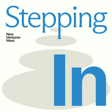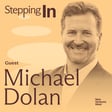Become a Creator today!Start creating today - Share your story with the world!
Start for free
00:00:00
00:00:01

Working with Leaders
Apple PodcastsAmazon MusicYouTubeSpotify
How does Integral Coaching, a method that works at a deep developmental level, translate to working with leaders and corporations?
This is a common question and elusive territory for potential coaches.
To help illuminate the topic, Adam Klein spoke with Andrea Garfield, founder and CEO of the Awesome Institute, a company that offers executive leadership and team coaching inside organizations.
Andrea shares plenty of examples of how Integral Coaching can
Transcript
Podcast Introduction
00:00:11
Speaker
Hi, this is Adam Klein, managing partner and faculty member at New Ventures West.
Return of 'Stepping In'
00:00:15
Speaker
And after a little bit of a hiatus, we're back with episode 20 of our podcast, Stepping In. A podcast where we delve into how integral coaching can address some of our most pressing issues we face as individuals, as communities, and as stewards of our planet.
Interview with Andrea, CEO of Awesome Institute
00:00:31
Speaker
Today I'm talking with Andrea, who is the CEO and founder at the awesome Institute, where she and her team coach executives to be more effective at work while also being more connected humans in leadership and all of life. We began speaking about what drew Andrea to integral coaching and why she finds it an effective and potent way to work with leaders. I think that the sort of whole person, multi-disciplinary approach
00:01:01
Speaker
appealed to me the most in that it's that's always resonated for me kind of in the world that learning lots of different things have always been really helpful. So when I had already started my practice, my coaching practice, when I started at New Ventures West and it fit kind of the way that I was approaching coaching the best of any other program that I could find, but of course had way more structure and
00:01:29
Speaker
depth and everything compared to
Coaching Leaders in Business
00:01:31
Speaker
what I was already doing. So it just felt like a way to really enrich the work that I was already curious about doing and hasn't disappointed in the years that followed. It's really been super useful and we use it even more than I thought we would in our day-to-day coaching and in the process that we lead our clients through. Yeah, we work with
00:01:59
Speaker
mostly leaders, mostly executive level. So C level, sort of senior VP level. From smallish companies, I think our smallest client is about 15 million in sales up to about 900 million in sales. Mostly in the US, we have a few international clients. So we work with, those are our primary individual executive coaching clients. And then we do some small group coaching.
00:02:28
Speaker
And now we have some large group coaching classes that we offer as well for lower level leaders. So our small group coaching is for sort of mid-level leaders and then the classes are open to anyone who wants to learn. Yeah. What was the inspiration for starting your company?
Impact of Coaching on Company Culture
00:02:51
Speaker
So my business partner and I come from the entrepreneur world.
00:02:56
Speaker
And we both had several companies before and were really involved in a lot of entrepreneurial education groups over the years and most on the volunteer side. And we were very aware of the particular kind of suffering that entrepreneurs experience. And so we were really excited about helping entrepreneurs with this, with their suffering and how to grow and how to see themselves in a different way.
00:03:26
Speaker
and how to help them alleviate that a bit. And then as we did more and more of our work, we realized that entrepreneurial suffering was not unique in any way, that it is essentially human suffering that everybody deals with. And the New Ventures West way of helping people or supporting people through that is really quite similar for anyone. And we decided to focus on leaders because of the impact they have on everyone around them.
00:03:54
Speaker
So if we can support and help leaders in an organization shift, the impact of that can be so great compared to helping somebody else who doesn't have a lot of influence on other people. Neither of their suffering is any better or worse than the others. But for us, especially with our background in leadership, it made a lot of sense to say like, where can we have the most impact? Where can we help the most people? And for us, leaders have been have been that for the past six years or so.
00:04:23
Speaker
Now we're starting to help lower level leaders. We're starting to help basically anyone in these larger format classes, because it really doesn't matter.
Emotion and Somatic Awareness in Leadership
00:04:33
Speaker
This work is super useful for anyone. And what kind of impact have you noticed in your work with leaders? What have you seen take place? It's really been pretty astonishing in that while we don't go in and do big cultural engagements,
00:04:54
Speaker
when you work with the CEO or COO or whatever in a company, their influence on the company is really quite profound. So when you teach a super smart strategic person that emotions are a thing or, you know, somatic awareness is helpful or about the Enneagram or whatever, and they really start to see the value of that, they start spreading it to the entire organization. So it happens in lots of different ways. They might have different initiatives, they might bring in
00:05:23
Speaker
Training they might just relate to people completely differently I have one client who's been who founded his company about 25 years ago and he's got thousands of people who work for him and He's changed pretty dramatically over the past couple of years and it's really starting to change the way the organization is run Which in in turn makes a lot of space for
Pragmatic and Integral Coaching Approaches
00:05:44
Speaker
the other leaders. He has about 40 leaders at the company for them to grow and for them to step into the work in in new ways both the work at the company and
00:05:52
Speaker
and their own personal development work. And they've got all kinds of coaching programs and different educational things throughout the company. So that because that awareness is there from the very top, that these sorts of shifts are possible and this sort of work is valuable, that a lot of people are getting to be involved. And can you say more about the way that you're working with them?
00:06:21
Speaker
that has this impact take place? Like what are you learning about? What works when you're working with a leader? I mean, I guess the, the, the short version is probably, we use the new ventures west methodology, um, way more out of the box than I expected we would because I'm not one to like follow process as a, as an Enneagram eight. I like to think that, you know, my way is going to be like a little bit better.
00:06:49
Speaker
But we've just found the process so useful. We use programs that are pretty similar to what we learned in the Adventures Last PCC program. And we combine that with a lot of real world experience and understanding and sharing those two things together, like what's real, what's practical, and how does all of this little more oblique or indirect work really support the day-to-day? Because if they can't see that,
00:07:18
Speaker
then it's not gonna be meaningful enough for them to really grab onto it is what we found. Right, right. So I'd love to explore this more because I think it's one of the, well it is one of the questions we sometimes get. Like, oh, this seems so woo woo or ethereal or whatever. Like, how does this help? I think earlier this year, I think it was in January, I wrote an article called Integral Pragmatism, like how these two things can live together, like being pragmatic and integral. But I'd love to hear from you
00:07:47
Speaker
in your experience, like you just said, marrying those two things together. How have you seen that go? What have you seen that works? Have you seen them support each other? So a lot of times when we're when our clients are choosing a coach, they're looking at, you know, us and maybe one or two other coaches that tend to be more goal oriented, like we're going to help you increase your revenue or we're going to help you get clear in your strategy or something like that.
00:08:18
Speaker
And then they talked to us and we're talking about all these weird things and they don't get it. And what we talk about is that if you're really looking at long-term development, so we only do programs that are a year in length, we don't do anything that's less than that. If you're looking for long-term development, you need to balance those long-term objectives with the day-to-day support that you need. So we actually explain the models that we use
00:08:46
Speaker
some of them, particularly the six streams of the different competencies and that sort of thing, and help to open people's eyes to the idea that there's a lot of stuff that we have to know and be good at or that we can know and be good at. And of course we're not going to be great at all of them. And if we can pick up a little bit of knowledge in each of these areas or a little bit of skill in each of these areas, it can really raise our game. And when we start, when our clients are to realize that there are these whole areas that they might not be paying attention to,
00:09:16
Speaker
they get really intrigued.
Six Streams of Competence in Coaching
00:09:18
Speaker
And when we start, you know, with intake and talking about the environment that they're working in, which is something that's very alive for a lot of people right now, right? They're beautifully crafted offices with everything that they need there. Now suddenly they're working in a corner of their house. And how does that affect your work and that it does affect your work and that it's actually a really important thing that they have a much better understanding of this. So we help them to see that it's not one or the other. It's not,
00:09:43
Speaker
Oh my God, help me with the crisis that's going on today. And, or, you know, where am I going to be five years from now? And how do I want to grow? It's about both of those. And so also meant that you coaches, we build this into the programs and then we hold both of those things for, for our clients. So how, what's going on in your life right now? Personal, professional, whatever. And how does that relate to your longer term development?
00:10:10
Speaker
And we're always helping to make that connection so that they can start to see, relatively quickly, oh, I'm doing the thing that I'm working on long-term. And it's showing up again and again and again in all areas of my life and really bringing connection and meaning to those long-term developmental goals.
Building Trust in Coaching Relationships
00:10:32
Speaker
Does that make sense? Yeah, I think so. And partly what I'm hearing is, because you brought in
00:10:37
Speaker
the one of the models, the six streams of competence which looks at our cognitive intelligence, emotional intelligence, somatic intelligence, relational intelligence, spiritual intelligence, and integrative intelligence, and building competencies in those or capacities in those different streams, which is going to have an immediate impact and a long-term impact.
00:11:06
Speaker
So that's one of the things I'm taking away from what you're saying is the method is, and you're working with leaders is let's build competencies, which are going to impact short-term and long-term outcomes. So shifting away from like what gives the outcome in the first, in the first place looks like, well, what are you paying attention to? What are your skill sets here?
00:11:31
Speaker
Yeah. And I think we have a lot of transparency in the process too. We don't just sort of whip something out of our magic coach hat and try to get them to do it. Like we're always saying, this is why we're doing this. We might have some really practical exercise or some really weird out there custom thing, but we're always going to say, this is why we're doing it. And actually in our programs, when we have our outcomes that we're, that we're driving to over the course of the year,
00:12:00
Speaker
where we list our self-awareness activities and practices and that sort of thing, we always link which outcome are these connected to? Why are you doing this? So that the thread doesn't get lost. After a while, when they coach with us, they start to trust that the thing that doesn't seem connected to the other thing, there is a connection, but I think it's really important for them to be really clear on what that connection is, because we can sometimes forget
00:12:29
Speaker
And I find that when they get the connection, they're more likely to keep doing the work. They're more likely to be connected to the pain or the benefit that they're trying to get from the work instead of sort of slogging through their list of practices in hopes that life will sort of vaguely get better. At the beginning of the program, what's the
00:12:57
Speaker
general feel from your clients? Like, how are they? Do you sense skepticism, openness? What's it like? That's a good question. I think it depends quite a lot. And I think I can mostly speak for my clients versus my other coaches. I think my personality might be a little bit different. I tend to work with a lot of eight clients, actually, because they
00:13:27
Speaker
From what they've told me, they find someone that can meet them, and they tend to, once they test me a few times, then they tend to relax. But it does, but it can take a while. There's definitely some skepticism. Yeah, I've had one client, you know, sort of grill me for 15 or 20 minutes in our first discovery call, and then she said, that's it, I'm done.
00:13:54
Speaker
And I was like, what do you mean? And she's like, I'm in, whatever you want to do, I'll do. Didn't ask me pricing, didn't ask me any details about how good she was going to work. She just like, poked at me enough that she felt like I can work with you, I can trust you, and you can, you can feel me and be there with me. And she was in and we worked together for a couple of years.
00:14:15
Speaker
And it was great. So that's not unusual sometimes, but other people really want to understand the methodology and they want to understand the process and they want to understand the transformation and or the practical aspects of it too, right? Especially if they're selling it to their boss. How will this benefit my leadership? And we build into our program some of those translations as well. So not only how to the
00:14:41
Speaker
how does the work connect to the outcomes we're driving to, but what are the leadership outcomes as well? And then different ways of thinking about it so that people can find meaning and find purpose in the work. If it doesn't have that, then it's not a good program and it's not gonna inspire change, I think. What do you think gives them the confidence or trust?
00:15:12
Speaker
But it's going to work out. I think it's different for everyone. But I think that their experience with their coach in the first call and those discovery calls that we do is really critical. And I remember when I was in the PCC and we were doing our first coaching session with a stranger who signed up for
00:15:41
Speaker
to be coached and came in and we're like, we're halfway through the program. We don't really know anything. How are we going to help this person that we know nothing about? And the faculty were like, don't worry, we'll be fine. And it was kind of amazing. And we were all shocked. And after Julie Engel, the leader of my PCC was like, most people have never been listened to in the way that you just listened to them in their entire lives. You just spent 30 minutes or whatever it was.
00:16:10
Speaker
just really being present and really being with someone and they've never had that. And it was shocking and I think it's true. I think people are not used to that or have never experienced it. And it's when they have that right from the first moment with a coach, they realize what's possible and they realize how supportive that environment can be and they really feel seen.
00:16:39
Speaker
And that I think is the thing that gives them the confidence to do the work and that they can trust us and that they feel comfortable with us to really reveal
Holistic Life Coaching
00:16:50
Speaker
everything. I mean, we're executive coaches, but we talk for us like nothing is off the table. We talk family, we talk relationships, we talk work stuff, we talk health a lot, not occasionally. So, and we make that really clear up front that if you're not willing to talk about all of those things, then we can't do our work together.
00:17:09
Speaker
But I think it just comes back to, you know, the fundamentals that Julie talked about, which is be there with them. And that's our most important job. Yeah, I'm really impacted by what you just said, like being there with them and how people really don't get listened to in this way. So in the example you talked about with that client asking all of her questions after 15 to 20 minutes,
00:17:36
Speaker
The sense I had was it wasn't so much the answer that you were giving necessarily, but that you were unclustered, that you were with her, that you were paying, listening to her. And she could feel that from you. So this, I know we always want to talk about like, Oh, we gave her the right answer. The very tangible things, which are important, but there's this other layer of the relationship, the coaching relationship.
00:18:06
Speaker
and how that can get established so quickly. Yeah, I think that was really one of the biggest learnings for me. And maybe the year after I finished PCC was that you sort of armed us with all of these tools and all these processes and everything. And I have an MBA and 15 years of leadership experience, and I know business leadership-y things to say, but none of that stuff
00:18:35
Speaker
usually matters. Especially at the high level leaders, they're used to power dynamics, they're used to controlling the room, they're used to influencing people and to be able to feel comfortable enough to sort of lay all that down and be vulnerable and be open and be curious. There has to be a relationship and it has to happen quickly. And it has to be powerful, I think, for them to
00:19:03
Speaker
to really get into that work. Because most people don't, at this level, they don't have many people that they can relate to in this way. They're so used to being at the top or having to hold it all together or having to be responsible for so many other people that they don't really get to think about themselves that much.
Challenging Work Norms
00:19:23
Speaker
And this is a chance to take some time for themselves, often in the service of others, but sometimes it's just their own time.
00:19:33
Speaker
I think that's really important that we can, that we can support them in that way. And that's really meaningful to me personally, too, to be able to, I mean, I was that person for a long time. And I didn't have coaches for most of my career. And I, and in looking back, I realized how different my experience could have been both professionally and personally, health wise, you know, I had the classic story of running myself into the ground, like
00:19:59
Speaker
Literally crash and burn like end up in the hospital kind of sick because I didn't understand self-care. I didn't understand You know all of these different elements and and for me to get to help clients and Not do that Super super meaningful super powerful and at the same time it helps me to Continue to practice that work in my own life and to lead my company now and to lead my family now and in a different way a different way of being a different way of leading and
00:20:29
Speaker
a different way of following. Yeah. So you mentioned just a minute ago when you were saying working with clients and that it's paying attention to all the areas of their life, not just work, which includes personal lives, relationships, and you said, and health. And I think you said, and that comes up a lot. Yeah, it does. You know, most of the clients we work with have been very affected by this culture of
00:21:00
Speaker
achievement, overwork, grit. I hate the word grit. I know everybody loves it right now, but to me, it's code for sacrifice yourself for something, money or power or the greater good or whatever. And I've been through that and it doesn't work. I think you have to be able to take care of yourself before you can do anything for anyone else. And
00:21:30
Speaker
We often start with clients, you know, how is your sleep? How is your nutrition? How is your exercise? How many hours a day are you working? And we very often have clients that actually cut their work hours in half or maybe 50% within the first few months and get more done, run their companies better or run their teams better. And they don't think that that's going to be possible. They kind of want to laugh and pat me on the head when I first talk about it.
00:21:59
Speaker
But as we start working on it, they realize that these things are true. And it's only going to make their life better to have more energy and more resilience and feel better. So that whole health line, while we're not health experts, we help people draw attention to how they're feeling and to help them, support them in finding solutions for that kind of
00:22:26
Speaker
for that kind of work because it's so foundational. I mean, we love to think that we're one of the things we say awesome Institute is we're not robots for humans. And we love to think that, you know, in the US, at least that we're robots carrying around these brains, and we'll just keep going and keep going. And someday Google will buy our company for a billion dollars and or whatever. And that doesn't
00:22:51
Speaker
usually happen. What happens is that we run ourselves into the ground and get thrashed and aren't very good leaders at that point and aren't very fun to be around.
Health and Self-Care in Coaching
00:23:05
Speaker
I was laughing when he said they kind of pat me on the head because I could just imagine in my mind the client saying, oh, aren't you so cute? I need you to help me work harder and faster and not get burned out by working harder and faster. And you want me to work less. That's naive. Yeah.
00:23:21
Speaker
So I'm curious when you face that maybe initial reaction, how you work with it, like what's your way of illuminating that this is actually challenging this assumption of theirs about working harder is the way to go. Yeah, well, sometimes I tell them the gory details of my own story. And, you know, to be honest, there's there is credibility in having run several companies and
00:23:49
Speaker
and the things that I've done over the years, which can be helpful. I sometimes I tell them about other clients that have been through this work. And really what I'm checking for there is openness. They don't have to buy it in the first, like before they sign up, but there needs to be some openness. If they're like, absolutely not, I'm going to work myself into the grave, then I don't want to work with that client. But if they're intrigued,
00:24:16
Speaker
That's all I really need. And then we just do a little bit of work, a little bit of work until they start to see the shift. And we have research that we've done. One of the most impactful bits of research about sleep for me was someone who's struggled to sleep for most of my life. I can be one of those people that doesn't need a lot of sleep.
00:24:41
Speaker
even though I actually do, everybody, everybody thinks they're one of those people that doesn't need a lot of sleep. Um, and there's this, there was a study that said if you, if you pull an all nighter, you know, you work all night or you don't sleep for a whole night, the next day you feel really physically impaired and actually your reflexes are at the level of being legally drunk. Um, but if you sleep like less than six hours for more than four nights in a row,
00:25:10
Speaker
You're also operating at that same level. The difference is because it's gradual, you don't feel it. So you think you're fine. So we sometimes when we, when we talk about this in coaching or when we, we've taught classes about this, we say like, you know, how many people come to the office drunk and make decisions about strategy and people and, you know, try to get along in meetings. Like if everybody was doing that drunk, it would be, you know, a shit show, but how many people come to work?
00:25:39
Speaker
day after day, year after year, with not enough sleep. Like, how much better could you be if just that piece was a little bit better? And people are kind of shocked to hear that because, you know, six hours or less of sleep is pretty standard for most of the people that start working with us. You know, it's hard to do all the things we want to do in the amount of time that there is. So sometimes things like that can help at least intrigue people.
Self-Awareness for Sustainable Change
00:26:07
Speaker
Yeah.
00:26:08
Speaker
And in this work with people, do values ever come to the forefront of what's most important to you? Or do you guys leave this into anything in terms of prioritization or what to look at, how to reorient themselves in their life? Yeah, we definitely do that. We don't do a lot of traditional values work with individuals. Sometimes we do. We do a lot of it. We do more of it with organizations.
00:26:39
Speaker
Um, but we do often say like, you know, what's important to you? How do you want to be spending your time? How is that going? You know, when people say my family and my health are my most important things, but I don't spend any of my time on them. Um, you know, that, that can help people too. Yeah. What would you say if you were to think about this client, this clients that you're work with, that you're working with?
00:27:07
Speaker
And you're mentioning health care. And people know it's important. And yet it's like it's neglected. What would you say you're really working on with them? Yeah, so this is what why we spend so much of the beginning of a program really the first three to six months really focusing on self awareness more than driving a lot of behavior change. And I liken it to the New Year's resolution way versus the
00:27:38
Speaker
maybe the New Ventures West way, right? When we say, oh, I'm going to start sleeping better and taking better care of myself on New Year's Day. And then, you know, by January 15th or something, it's kind of out the window. It's until we understand why we're doing things or not doing things, we don't have much of a chance to change it other than by like brute force most of the time.
Creating Meaningful Change
00:28:01
Speaker
Even if we, you know, I'm real big into habits, but if we don't know what's driving those,
00:28:06
Speaker
We can't, it's just, it's just forced, you know, or it's just discipline. And that, that runs out after a while. So, you know, we, we often start our clients with the Enneagram work because it's a great way into self exploration. And if somebody understands that they're actually getting more fulfillment from helping others than from taking care of themselves, then of course they're spending that time on other people and not on their own self care or health. Um, or if they're,
00:28:37
Speaker
you know, super worried about things and they're spending all of that time making contingency plans. Well, that's how they feel safe and secure. So of course they're going to be spending their time doing that, not on self-care. And so when we start to kind of unwind those patterns and help people see them over time, then they go, oh, I'm doing the thing where I'm trying to, you know, get fulfillment from helping everybody else. But in the process, I'm trashing myself, which means I can't help people as much as I want to be helping somebody.
00:29:06
Speaker
So if I'm really all about helping, I need to strengthen my foundation so that I can make a bigger impact on the world and maybe get some clarity on what that impact is or what that help is really about. And over time, they might see that that extra hour or two of answering people's questions on email at nine o'clock at night isn't very impactful, that actually that time would be better spent on themselves or on their family or whatever.
00:29:34
Speaker
So that's when we really start to see a lot of long-term sustainable change. I mean, and that's what drove me to New Ventures West in the first place, I think, is I've never liked the sort of quick fix, go to a workshop, learn anything. It's awesome. It's totally going to change my life. And by Tuesday, I've forgotten everything or I haven't had time to implement it. And it's sort of out the window. You know, we've all done this at a conference or a
00:30:03
Speaker
workshop or something like that, or inspirational coaching thing. And for me, that lasting change was really what's meaningful to me as a coach. And so this approach, while it's longer and slower, and it can be more complex, it's not temporary. It's not fun, interesting, like in the moment, kind of
00:30:29
Speaker
thing. It's not entertainment. It's just lasting work and it changes people's lives permanently.
New Approaches for High-Achievers
00:30:35
Speaker
And all of our clients have found that. And that is one of the most exciting parts of the work for me. Right. I'm really appreciating this because it's highlighting how, like you said, brute force sometimes our way of like, well, if I just muscle through this or
00:30:59
Speaker
You probably hear it from people. If I just get over myself, then this wouldn't be an issue or I can just do this. And there's this, this behaviorism model that we have. Yeah. But it requires so much effort to like constantly be monitoring and like, this isn't the action I want to take, or it's not natural for me, but I'm going to push myself through it. But then if we're totally depleted.
00:31:24
Speaker
worn out like what is our what is our capacity to always be monitoring what we're doing is driving ourselves to do something differently it wears out really fast like you're saying yeah so this way exactly well actually where is this behavior coming from in the first place let me study it a little bit and then work there yeah and this is actually an opening that a lot of our clients have when they come to us because
00:31:52
Speaker
We were working with people that are super successful, right? Like right they've achieved a lot. They're smart. They're competent. They They've got a lot of skills. They've often brute force their way through Their life for the last 40 years or whatever, right? Like this is not an what you're describing is not unfamiliar to them at all And suddenly it's not working Like it used to work, right? Right. You've got a couple of kids. You've got all of these
00:32:22
Speaker
employees, you've got people all over the world. You know, you've got life happening. And it's just it's just not working. And it's starting to feel like a grind. And people come to us and they're like, this has worked so well for me for so many years. What is wrong with me? Nothing's wrong with you. It just doesn't work that well. And it takes so much energy that when you're trying to do more, you've got to figure out a new way of doing things, a new way of being in the world.
Rediscovering Self Through Coaching
00:32:51
Speaker
And, and when people come to us in that space, that's really a really wonderful place to get into this kind of work, I think. Right. Well, yeah. Cause they're open to it. Like you're saying, and that's really critical. Yeah. The other thing I think you're, for me, you're highlighting is the role of coach, which is to help people study themselves or look at their life, pay attention to what they're doing a little bit differently.
00:33:21
Speaker
Because we all have our little, our blind spots about why we're doing what we're doing to have someone there to say, well, maybe what would happen if you paid attention to this that you're not paying attention to? What might you notice about yourself? Yeah, exactly. Exactly. And, and I think it can be really fun for people to rediscover themselves in ways they didn't think were possible. Um,
00:33:50
Speaker
you know, maybe they're in later stages of their career or they've been doing the same thing for so long and being in the world in the same way to suddenly say like, oh, wow, like, you know, I never thought of myself as a or I definitely thought of myself as not a meditation person or not an artistic person or not a person interested in any of these things. And suddenly I'm finding that I am or I'm finding that in doing these things, I'm learning all sorts of
00:34:21
Speaker
fascinating, interesting things about myself. And it's, it's changing my relationship with my family. It's changing my relationship with my work, um, with the future in a lot of different ways.
Inspiration from Client Growth
00:34:32
Speaker
Um, which is super exciting to be a part of, I think watching people like reawaken to the lives that they already have. Right. All right. What's it like for you to work with clients? Like, how are you impacted by them?
00:34:51
Speaker
I think I'm really inspired by them, and I'm really grateful that I get to be on the path with them. Watching my clients do this often very challenging work, day after day, month after month, year after year, and continue to
00:35:18
Speaker
to learn more about themselves, to learn more about others, to learn different ways of being in the world in many of them, most of them, all of them in service of something greater. And that's really amazing to be a part of. And I think now with the, we're sort of in the midst of this pandemic and watching
00:35:43
Speaker
that I've been working with for years. We actually just did a whole alumni series of group coaching and brought back people who haven't coached with us in a while and finding where they are. And maybe they've been out of coaching for a few years even, and how they're still using the work that we did together to help cope and to help lead has been really, really wonderful for us. And then with the clients that we're currently coaching, watching how they're handling this,
00:36:13
Speaker
It's so different and they know it's so different from the way that they would have handled it before this work and their ability to reflect and be resilient and be understanding of the human parts of their work is just, it's really exciting. We've got quite a few clients actually that are pretty involved in either essential services work or
00:36:40
Speaker
sort of peripheral, but close to it, and thinking about like, how am I going to protect my employees? And how are we going to have conversations about this stuff? And what's coming up for me in this process? And am I sort of dumping it on everybody else? Or am I dealing with it and sharing it in ways that are useful or helpful or real? Right. Right. Right.
00:37:10
Speaker
That makes me feel really good about the ways that we're helping leaders to grow and to embrace their humanity rather than reject
Collaborative Relationships with Clients
00:37:21
Speaker
it, right? To kind of go back, we don't have to be brains being carried around by robots. We can be full humans and still do this work really well. And from my perspective, I think we're much, much better at all of this stuff when we use all of our humanness, right?
00:37:39
Speaker
just our brain. Right. Well, it's something you said earlier, caught my attention, too, about this, of working with clients. And I find this for myself, too, it inspires us as coaches to keep up our own practices and pay attention to how we're living so that we're living what we're bringing to our clients and not just talking about it. Yeah. Yeah, that definitely resonates.
00:38:09
Speaker
Actually, I'm also smiling because I had a client send me a book a couple weeks ago that he came across that was close to the work that we'd been doing together. And he was like, you should definitely read it. It's going to be great. And he sent me a book instead of me sending him a book. So not only being inspired to do my own work, but actually even occasionally supported by clients.
00:38:39
Speaker
But yeah, it definitely helps me keep up my own work. It helps me remember the value of coaching. I mean, I have my own coach and to remember what it's like to be the client, I think is really important all the time and the challenge of that and to have compassion and be with them. Like we don't really think about it like teaching them to figure it out or like helping them to do it.
00:39:07
Speaker
it's really like walking with them along the path, because we don't know their work, we don't know their family, we don't know what they're up to. So we can't, you know, predict exactly how things are going to go, or even kind of how things are going to go, but we can be with them along the way.
Adapting Coaching to COVID-19
00:39:23
Speaker
And I think that's just as impactful for us in our own growth and development, if we look at it that way, as it is for the client.
00:39:34
Speaker
Maybe one question there is, but how would have you seen the natural translation of like how you are already working with clients, support them in this pandemic? So like maybe a better way of asking this question is, was it a big pivot in terms of coaching in the COVID environment versus coaching in the non COVID environment? Not in terms of the content of what you're coaching on, but how you would coach someone. Because to me it seems like
00:40:05
Speaker
The whole New Ventures West approach. This is a ripe opportunity for its application. Nada, oh, we need to change how we're coaching. Yeah, for sure. I think it's, I think you're right. It's been a, it's been a continuation. We actually do all of our, have done all of our coaching on Zoom or almost all of our coaching on Zoom for years.
00:40:29
Speaker
So logistically, our clients are very used to working with us remotely and used to doing deep work remotely, which actually has been really beneficial for them as they transition their businesses online. I've heard a lot of stories about other people that are having a really hard time connecting with their teams online. And I think when you've had at least some experience doing that with your coach, it's helpful. So that part has been pretty seamless for us, but
00:40:57
Speaker
You know, I think a lot of people at the beginning kind of went back a level, maybe back to immediate concerns for a while and for us to be there and to say like, this is okay. Like you can check in with your body. You can check in with your emotions. You might not know what's there like you did two weeks ago, but you've got the tools you have to practice. We're here for you.
00:41:20
Speaker
I was at the beginning of this talking to clients more frequently. We usually talk twice a month. And so some of them were talking to us a little bit more often.
Podcast Conclusion and Call to Action
00:41:29
Speaker
But otherwise, it was just sort of the same stuff. You know this stuff. You've got the skills here. Let's lean on them. Let's practice together. Let's slow it down. Probably leaning more on thematic than usual.
00:41:45
Speaker
you know, when your brain is going crazy with all of the unknown and emotions are all over the place and relationships and connections with other people are a little bit scattered. You know, getting into the body is something that's always there and is actually a very practical tool for grounding and finding like, where am I? And then from there, how am I feeling? What am I thinking? How am I connecting with others? What is my connection to the greater world and how all these things fit together? So
00:42:15
Speaker
I think that's probably been the biggest shift, but it hasn't been it hasn't been huge. All the programs still are very relevant. And it's, it's, it's quite obvious to the clients, oh, I'm really doing the stress behaviors here, or I'm really reverting to the old way of doing things. How do I get back? How do I find my way back? And it's been it's been quite
00:42:42
Speaker
quite quick actually. I've been really surprised by how well people have been able to get back to kind of where they were on the path. Please spread the news by sharing this podcast on social media and letting us know what you think by emailing us at SteppingInAtNewVenturesWest.com. Until next time, take care.
